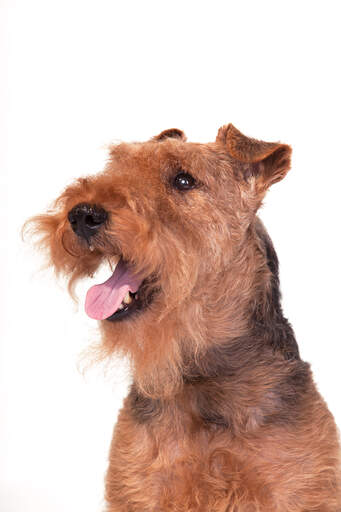Welsh Terrier Dogs










Breed Rating (1 Reviews)
| Appearance | |
| Friendliness | |
| Hardiness | |
| Garden |
History
The Welsh Terrier, or simply Welshie, comes from (you guessed it) Wales, and is one of the oldest Terrier breeds around. They were originally known as the black and tan terrier, the breed was renamed in 1885 by the English Kennel Club and the breed was standardised. Their “rough” coats were bred out of them. They were used to hunt and kill vermin, mainly fox, otters and badgers. They were a common sight on many farms.
Behaviour
Welshies are bold, brave and overall fun. They have a passion for life that really adds to their character. They love to play games with their owners. They have a mischievous, yet still good hearted, streak to them. It’s just the way they are. They love children and get along well with other dogs if properly socialized. They cannot be trusted with small furry animals as their hunting instincts are just slightly too strong and they won’t be able to help themselves. They are reserved when around strangers, but almost never aggressive. The same goes for other dogs, reserved but almost never aggressive unless provoked first.
Indoors, this will be a laid back and chilled out dog, they enjoy curling up next to you on the couch or in bed, though they can have the occasional hyperactive episode. Being bred to work alone has made this breed a very independent thinker, which makes training difficult. They soon get bored of repetition and things we constantly need to be fresh and new in order for you to get anywhere with them. They can be stubborn at times and will require constant reinforcement of the rules. If they feel like it, they can learn quickly, but then again they won't always choose to listen to your commands. You have to make training fun and stimulating in order to get anywhere.
The Welshie has a tendency to bark a lot and needs to be taught the “quiet” command early on to avoid many a sleepless night. Their inquisitive nature means that they are always alert, ready to go at a moment's notice. They tend to be better mannered than most other Terriers, but still have a strong hunting instinct and will need to be walked on a lead or in a safe area. A long walk and a play session will be needed each day to tire this breed out, they can also make for good jogging partners.
The wiry coat that the Welsh Terrier has needs to be brushed at least a couple of times each week, plus some shaping every 3 months to maintain the face and legs. Show dogs will need stripping and pets will need clipping - whenever you feel the coat is slightly too long. They are a hardy breed that suffers from no major health problems, though Lens Luxation and Glaucoma are more common in this breed.
Temperament
Welshies are a playful and inquisitive breed. Always up for a game of fetch or a walk, but don’t be fooled by their seemingly innocent personalities, the second you turn your back they’ll be sighting out any weak spots in your fence to make their great escape. They work best within an active family as they can become easily bored when at home. Welshies aren’t the best when it comes to meeting new people and dogs alike, early socialisation can combat this.
Health Problems
Potential health problems include lens luxation (detachment of the lens inside the eyeball which can cause blindness), glaucoma, epilepsy, allergies, luxating patella (dislocation of the kneecap), Legg Calvé Perthes disease (degeneration of the femoral head which can cause lameness and joint swelling) and canine hip dysplasia (CHD).
Breed Details
- Status: Common
- Life Expectancy: 12 - 13 years
- Weight: 20 - 22 lbs
- Height: Up to 15"
- Rare: No
- Coat: Medium - Hypoallergenic
- Grooming Requirements: More than once per week
- Town or Country: Either
- Minimum Home Size: Small House
- Minimum Garden Size: Small to Medium Garden
- Breed Type: Pest Control Dog
- Size: Medium
- Energy Level: Medium
- Exercise Required: Up to 1 hour
Welsh Terrier Pictures
![[no caption]](https://cdn.omlet.com/images/cache/251/198/welsh-terrier-dogs-no-caption-7a2bf33a_2830f1fe.jpg)
Latest Reviews For Welsh Terrier (1 of 1)
A most wonderful breed, elegant, characterful, affectionate, perfect. - David,
If you want a biddable, subservient dog that you want to control, get something else! If you want a terrier with a very individual personality and a great love of life , a welsh terrier is challenging in a good way, and if you have patience and good sense of humour, your life will be transformed when you let a Welsh Terrier into your home.












